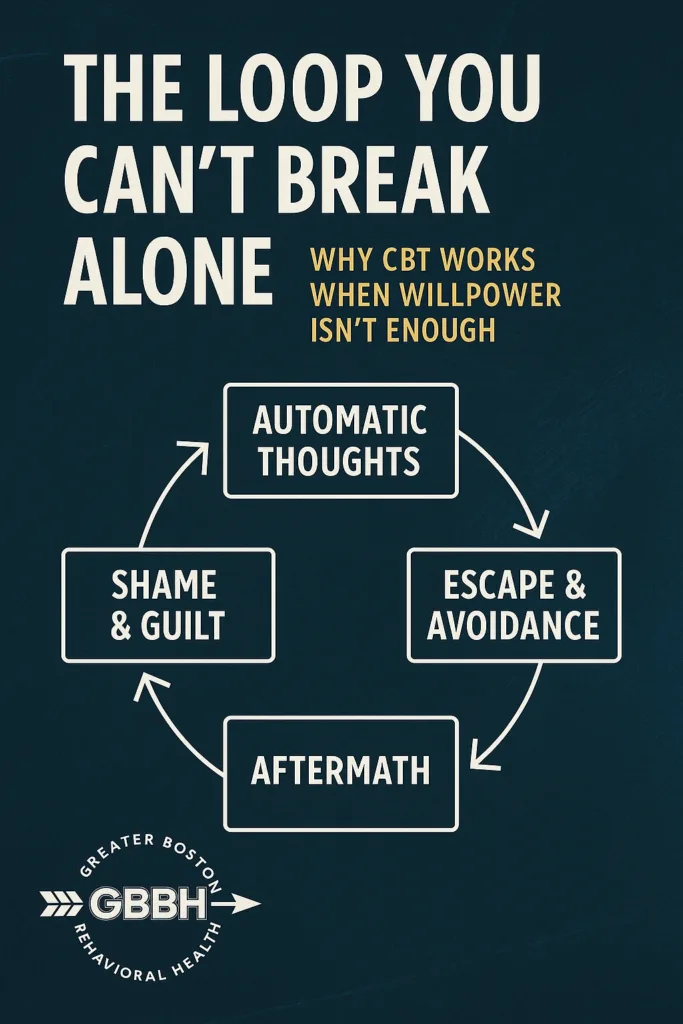You’ve made it this far on grit, denial, and late-night self pep talks. You get up, get through the day, keep the mask on. Nobody suspects anything. Maybe not even you—not fully. But something’s been off for a long time.
It’s not a crisis. It’s a quiet collapse. And no amount of willpower can fix something that lives deeper than decisions.
That’s where CBT comes in. Not to make you start over—but to stop the loop that keeps dragging you back under.
The Loop Isn’t Random. It’s Familiar—and Smart.
Here’s how the loop usually goes:
You push through the week. You show up for everything. You perform the version of yourself people expect.
Then something small happens—an email, a silence, a shift in your partner’s tone. Suddenly, your chest tightens, your mind starts spinning, and a thought hits:
“This is falling apart. I’m falling apart.”
So you isolate. You numb. You avoid.
And the loop resets. Same thoughts, same escape hatch, same aftermath. Shame. Guilt. Overcompensation. Try harder.
If this feels eerily familiar, that’s not a coincidence. It’s conditioning.
CBT doesn’t just notice the loop. It maps it. And then it teaches you how to interrupt it.
CBT Isn’t “Talk Therapy.” It’s Tactical.
Forget lying on a couch rehashing childhood trauma every week. CBT—Cognitive Behavioral Therapy—isn’t about endless introspection. It’s about connection: between your thoughts, emotions, and behaviors.
Here’s how it works:
- Identify automatic thoughts that trigger emotional spirals
- Challenge distorted thinking (like catastrophizing or black-and-white beliefs)
- Replace reflexive reactions with intentional responses
- Build behavioral strategies that actually stick—even on hard days
You don’t have to “open up” right away. You don’t even have to believe it’ll work. You just have to start where you are.
“High-Functioning” Doesn’t Mean Emotionally Safe
A lot of our clients say this in their first session:
“I’m not in crisis. I just don’t feel okay anymore.”
Being high-functioning while struggling internally is like walking through a snowstorm in a three-piece suit. You look great. But you’re freezing—and no one can see it.
You’re the one people rely on. The planner, the fixer, the dependable one. But when you finally slow down, the silence is unbearable. That’s where CBT becomes more than a therapy method—it becomes a space to stop performing.
CBT Is Built for the Person You’ve Had to Become
If you’re someone who needs clarity, structure, and evidence before you buy into something, good. CBT was designed with people like you in mind.
You won’t be told to just “sit with your feelings.” You’ll be taught how to observe them, evaluate them, and respond to them. You’ll build a toolkit—not a vulnerability wall.
And if you’ve tried therapy before and it didn’t land? That’s okay. CBT is different. It doesn’t just give you insight—it gives you strategy. Think less “tell me how you feel” and more “here’s how this pattern operates, and here’s how we start to change it.”
Real People. Real Loops. Real Change.
“I didn’t even realize how much I was assuming worst-case scenarios every day. CBT gave me a way to check those thoughts before they took over.”
— Outpatient Client, 2023
“I thought my panic meant I wasn’t strong. CBT helped me see it was a learned response—and I could unlearn it.”
— Greater Boston Behavioral Health Client
CBT isn’t magic. But it’s close—because it meets your reality with something you can actually use. And it works without you having to collapse first.
You’re Not “Too Functional” for Therapy
Therapy isn’t reserved for people in crisis. It’s for anyone who’s tired of fighting invisible battles while maintaining a perfectly curated life. You don’t have to hit rock bottom. You don’t have to label yourself.
You just have to be willing to stop pretending everything’s fine when it’s not.
At Greater Boston Behavioral Health, we work with professionals, parents, caretakers, creatives—people who are good at showing up, but privately unraveling. We understand what it means to look like you’ve got it together while feeling like you’re holding on by a thread.
CBT can help you stop the spiral before it costs you something you care about.
Why CBT Keeps Getting Recommended (Because It Works)
There’s a reason CBT shows up in almost every clinical guideline for anxiety, depression, and substance use patterns: it’s practical, adaptable, and incredibly effective.
Whether your loop involves:
- Overworking and burnout
- Emotional reactivity in relationships
- Chronic anxiety or self-doubt
- Substance use that no longer feels casual
- Perfectionism that’s wearing you down
CBT helps you do more than understand it. It helps you change it.
What Makes CBT at Greater Boston Behavioral Health Different?
We don’t do cookie-cutter care. Every CBT plan is tailored to you—your schedule, your goals, your mental bandwidth.
- One-on-one sessions with trained CBT clinicians
- Personalized worksheets and real-life tools you can use immediately
- Support for co-occurring challenges like ADHD, anxiety, trauma, and substance use
- Boston-based care—in person or virtual
And we won’t ask you to become someone new. And for those in Needham, Waltham, Newton, or West Roxbury, we have nearby locations to make care accessible. Just someone more at peace with who you already are.
FAQ: CBT for High-Functioning Adults
What does a CBT session actually look like?
You’ll sit down (virtually or in person) with a clinician who helps you identify a specific issue or thought pattern. You’ll explore how your thoughts affect your feelings and behaviors, and you’ll leave with strategies to try between sessions. It’s structured but flexible.
How is CBT different from other types of therapy?
Unlike talk therapies that focus on insight alone, CBT focuses on action. It teaches you how to interrupt unhelpful patterns and build new ones—quickly and sustainably. It’s collaborative, goal-oriented, and evidence-based.
Is CBT only for anxiety and depression?
Not at all. CBT is also effective for trauma responses, perfectionism, burnout, substance use patterns, and even physical health issues influenced by stress. It’s especially helpful for high-functioning people who feel stuck but don’t know why.
What if I’ve tried therapy before and it didn’t work?
That’s common. Not all therapy fits all people. But CBT is different—it gives you tools, not just space. It meets you with strategies, not just support. And if it didn’t work before, it might be worth trying with a provider who specializes in your specific challenges.
Do I have to be in crisis to benefit from CBT?
Nope. CBT is ideal for people who are managing day-to-day but feel stuck in patterns that don’t serve them. It’s for high-functioning people too tired to keep pretending they’re okay. It’s never “too early” to seek help.
You don’t have to keep living in your head.
Call (888) 450-3097 or visit Greater Boston Behavioral Health’s CBT program to learn more about CBT services in Boston, Massachusetts. You deserve clarity—not just control.


